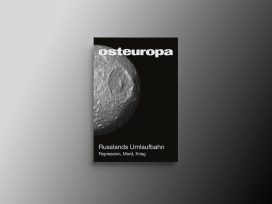Seven consequences of the Dutch referendum
A majority of almost two-thirds opposed the Association Agreement between the European Union and Ukraine in a referendum in the Netherlands on 6 April. As the public debate surrounding the referendum gained pace, the Ukrainian independent TV channel Hromadske became an important forum for associated discussion. Now that the results are in, Hromadske journalist Volodymyr Yermolenko assesses the implications for EU-Ukraine relations, and European politics in general.
Despite significant efforts on the part of both Ukrainians and Netherlanders, the majority of voters in the referendum in the Netherlands on 6 April opposed the Association Agreement between the European Union and Ukraine. According to preliminary data, 61.1 per cent of voters were opposed to the measure, while only 38.1 per cent voted for it.
Supporters of the agreement had hoped for a low turnout and, until the very last minutes of voting, the suspense remained high. But the final turnout was 32.2 per cent, surpassing the 30-per-cent threshold for the referendum’s outcome to be valid.
Hromadske has already analysed five possible scenarios for future developments after the referendum. Here, I try to analyse its direct consequences.
1. Free trade with the EU will come into effect anyway
Despite the negative consequences of the referendum for Ukraine, a free trade zone between the EU and Ukraine will still be implemented. The reason for this is that more than 90 per cent of the content of the Association Agreement falls under the authority of the supranational institutions of the EU, meaning the European Commission, the European Parliament and the Council of the European Union, rather than the individual member states. This includes the proposal for a free trade zone. The Netherlands “cannot singlehandedly invalidate the parts of the Association Agreement that concern trade and the economy – and that is the vast majority of the agreement”, confirms Oleksandr Sushko, research director at the Institute for Euro-Atlantic Cooperation.
Robert van der Noordaa, a Dutch journalist, comments: “Those opposed to the association want to invalidate the agreement, but in my opinion that will never happen. I think that the EU cannot permit itself to do this, and that under no circumstances can the portion of the agreement that relates to trade be invalidated”.
Entirely separate from this is the idea that the government of the Netherlands, taking into account how its citizens have voted and a possible negative decision by parliament, could try to block the final ratification of the agreement on the level of the Council of Ministers of the European Union. But this scenario is unlikely: it would essentially mean entering into conflict with all the other EU countries that have already ratified the agreement, and it is hardly likely that the Netherlands will permit itself to do so.
Moreover, it is important to remember that the Association Agreement, including its free trade provisions, is currently being applied in a so-called “provisional” format. So it is already being implemented – even despite the fact that it has not been fully ratified. This is how EU law works.
However paradoxical it might seem, this provisional application can continue indefinitely, until the process of ratification is completed. That holds true even if this process has de facto been stopped. EU law “has no time limits” for this, says Sushko.
2. The referendum will have no impact on a visa-free regime
The negative outcome of the referendum could be made use of by those forces in the Netherlands that would object to granting a visa-free regime to Ukraine. Although the process of “visa liberalization” and the Association Agreement are not formally linked, lots of issues were mixed up together in the recent campaign. And thus anything could happen.
However, Oleksandr Sushko points to a reverse process: “On the contrary, currently I am increasingly hearing a different take – that this ‘bitter pill’ needs to be sweetened for Ukraine, and thus there will be increasing unanimity on the matter of introducing a visa-free regime”, he says.
In the coming days or weeks, the European Commission is expected to issue its official legislative proposal regarding the abolition of visas for Ukrainian citizens, which will then be voted on in the European Parliament and the Council of the European Union. “Currently I have no grounds to expect that under these conditions the Netherlands will want to deepen the problem”, Sushko adds.
Dmytro Kuleba, ambassador-at-large of Ukraine, has spoken about the rise in “emotional support for Ukraine” in conjunction with the referendum: “An analysis of today’s European media shows that many European media outlets are treating these results as unjust”, he says. Several Dutch politicians have expressed similar feelings of injustice or even guilt. Thus, however surprising, this defeat might mean important symbolic gains for Ukraine – including a visa-free regime”.
3. Corruption in Ukraine will become a “red line”
These positive aspects should not conceal the major negative: the referendum is a symbolic defeat for Ukraine. And this defeat is connected both to euroscepticism among the Dutch and to the image of Ukraine itself – an image in which the theme of corruption plays the main role. This is clear from the results of an Ipsos sociological survey published the day before the referendum: 59 per cent of those opposed to the association explain their position with reference to the high level of corruption in Ukraine. The publication of the Panama Papers by various European media, including in the Netherlands, a mere three days before the referendum, has only strengthened the opinions of Dutch eurosceptics in this regard.
Thus, this referendum defeat is really a red line for Ukraine. It looks like Ukrainian corruption is increasingly less tolerated in Europe, that there is less willingness to turn a blind eye to it. After Maidan, there was a focus in European policy-making on giving the Ukrainian government moral support and striking compromises, but the time for that has already passed. From now on, for every argument Kyiv makes about Ukrainians’ fight for European values, it will be reminded of the sky-high level of corruption and its lack of an approach to combatting it. And if there is no progress in this arena, no other argument will help Ukraine.
4. Ukraine will gradually learn to communicate
The Ukrainian information campaign in the Netherlands in support of the association was the “largest informational campaign in the history of our independence”, says Dmytro Kuleba. The lead role was played by civil society, but the campaign was a good example of cooperation between civil society and the Ukrainian state, adds the diplomat.
Vasyl Myroshnychenko, the head of the Ukrainian Crisis Media Center office in the Netherlands, comments: “A campaign in support of the association, called “Hop Nederland Hop”, got more than three million views in the past two weeks, and 85 per cent of viewers were from the Netherlands.” At the same time, he acknowledges that the most complicated problem for the Ukrainian campaign was that of channels of communication: “We were often working among the high-brow media, where they already all supported us. In contrast, making it into the tabloids or regional press was extremely difficult”, Myroshnychenko adds.
The experience of the Netherlands campaign could become a first step for Ukraine in forming its own image. And for its own re-branding.
5. The Netherlands will look for a Plan B
Now the government and parliament of the Netherlands will be confronted with a serious dilemma. On the one hand, they cannot ignore the result of the referendum: voters will not forgive them for that.
“The recommendation our voters made to us needs to be taken into account”, says Han ten Broeke, a deputy from the ruling People’s Party for Freedom and Democracy. “So we will have to re-examine the law [passed by the Dutch parliament in 2015] that made upholding the Association Agreement with Ukraine mandatory for us”.
Even among liberal Dutch intellectuals, there is a consensus that it is impossible to ignore the results of the referendum, says the journalist Zhanna Bezpiatchuk, who has reported on the course of events in the Netherlands. The argument that the referendum can be ignored because turnout was low is a losing one, and it could lead to an even greater outbreak of euroscepticism, she believes.
On the other hand, objectively speaking, the results of the referendum are by no means representative of the majority of Dutch voters. 68 per cent of voters did not participate in the referendum at all.
“For me, the most important number is how many ‘voted with their feet'”, says Oleksandr Sushko. The main reason for low turnout is “mistrust of such a manipulative referendum, where by means of one question they are trying to solve a completely different question”, he says.
Instead, those citizens who voted against the referendum (who, taking into account the low turnout, made up only 19 per cent of the total electorate) comprise the core of the populist electorate. And the question is whether particular parliamentary parties will conclude that it was their voters who were opposed to ratification.
For example, according to a survey, 92 per cent of supporters of the PvdA (Labour) party and 53 per cent of VVD (People’s Party for Freedom and Democracy) supporters (two parties that are part of the ruling coalition) are in favour of the agreement. Thus these parties will be faced with a dilemma over how to vote in parliament: in line with what their voters are telling them, or according to the “recommendation” of the referendum results.
In any case, this mixed-up situation will force Dutch politicians to seek a political balance that, on the one hand, takes into account the opinion of voters and, on the other hand, remains within the context of internal and European politics.
Talking with Hromadske, Broeke says that right now, it is difficult to predict the results of parliamentary discussions. After all, parliament is free in how precisely it interprets and accepts the results. Thus, most likely, the result will be a compromise. Which could, for example, establish that certain portions of the agreement do not apply in the Netherlands.
6. Polarization will increase within the EU
The day after the referendum, French president François Hollande announced that France and Germany will continue to support association with Ukraine. This is an important gesture: it indicates that there is little chance of a “domino effect” in Europe, whereby other countries would also want to reconsider ratification. The two biggest countries of the EU gave a clear signal that they will try to prevent this. So the Netherlands will practically be alone in this sense. And it will be extremely difficult to advance its negative take on association with Ukraine.
On the other hand, the EU is awaiting yet another dramatic event: the British referendum on EU membership, which will take place on 23 June. It is entirely possible that no major compromises on the Association Agreement with Ukraine will be made before then. After all, any compromise, which will de facto keep the association in place, will significantly strengthen the arguments of European eurosceptics, because it will give them further grounds on which to assert that there is a “democratic deficit” in the EU, and that it does not listen to the voice of its own voters.
7. Populists will gain strength in Europe
The referendum attested to the fact that Europe is moving ever more into an era of populist politics. Key decisions are increasingly influenced not by rational reflection, but by emotions or even instinct on the part of voters. One of the arguments made by opponents of the association is the desire to turn inwards and concentrate on internal problems.
“How can we show solidarity with Ukraine if we have no solidarity with each other? We first have to solve our own problems in order to be able to help someone on the outside”, says Eric Smit, the editor-in-chief of the online publication ftm.nl, who supported the opponents of ratification.
The victory of those opposed to the association is an important signal that populism is effective and leads to electoral results. Thus we can expect that this will only give new strength to European populists – UKIP in the United Kingdom, Front National in France, Alternative für Deutschland and Die Linke in Germany, the Sweden Democrats, the Hungarian parties Fidesz and Jobbik, and others.
Today, it seems, Europe is entering an era where the key standoff is not the traditional controversy between right and left, but a confrontation between liberals and radicals, between a politics of reason and a politics of instinct. And it is important that Ukraine be on the side of reason in this standoff. Because European populism is against Ukraine.
Published 11 April 2016
Original in Ukrainian
Translated by
Katherine Younger
First published by hromadske.tv, 7 April 2016 (Ukrainian original) Eurozine and Hromadske International (English version)
Contributed by Transit © Volodymyr Yermolenko, hromadske.tv / IWM / Eurozine
PDF/PRINTPublished in
In collaboration with
In focal points
Newsletter
Subscribe to know what’s worth thinking about.
Related Articles

Russia’s orbit
Osteuropa 4/2024
Repression, murder, war: on the logic driving the Putin regime toward ever-greater excesses of violence. Featuring Yuri Andrukhovych on the Russian colonial empire – the only ever to have tried to reconquer a former possession. Also: articles on Navalny, and on what next for Georgia?

The difference between knowing from distance that war is being waged and living that reality couldn’t be more extreme. But can awareness of multiple repercussions turn protective disassociation from violence into active solidarity? ‘The Most Documented War’ symposium in Lviv, Ukraine, provides valuable pointers regarding engagement and responsibility.






